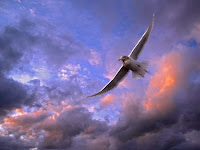No rose, yet felt myself a’bloom,
No Bird – yet rode in Ether –
-
F190 (1861)
While the sentiments in this couplet
are beautifully expressed, an understanding of the lines benefits from a larger
context. They were part of the third
of three “Master” letters that Dickinson wrote between 1858 and 1861.
We do not know if she ever posted a
final copy or how many other
letters she might have written, but we do have these three marked up/marked out
letters. No one knows who Master was – not even Emily’s sister Lavinia who
discovered the letters after Emily’s death. Master’s identity has been a great
source of controversy ever since.
It might have been Samuel Bowles, for
she was very involved with him during this period (although he was married).
The three letters suggest that Dickinson had had a relationship with Master for
quite awhile and that he did not live anywhere convenient to Amherst. It might
also have been Charles Wadsworth, a charismatic Presbyterian minister whom
Dickinson heard preach in Philadelphia in 1855. Wadsworth was also married. She was there to get medical treatment
for her eyes – and was in quite a bit of distress about her vision. She came to consider him her “dearest
earthly friend.” Although they had a correspondence, none of it survives.
But no matter to whom the letters
were written, they reveal an intense, passionate nature – one surely at odds
with the image of Dickinson as a
reclusive and virginal woman dressing in white and sticking to her room. That
isn’t to say that Dickinson had a lover, but only that she clearly had yearnings,
even if only sublimated desires that she might find fulfilled in a heavenly
marriage.
But here is the Master letter from
which the current couplet comes:
Master,
If you saw a bullet hit a Bird--and
he told you he was'nt shot--you might weep at his courtesy, but you would
certainly doubt his word.
One drop more from the gash that
stains your Daisy's bosom--then would you believe ? Thomas' faith in Anatomy, was stronger than his
faith in faith. God made me-- \Master—[…]. I dont know how it was done. He built
the heart in me--Bye and bye it outgrew me--and like the little mother--with
the big child--I got tired holding him. I heard of a thing called
“Redemption”--which rested men and women. You remember I asked you for it--you
gave me something else. I forgot the Redemption […] and was tired--no more—
No rose, yet felt myself a' bloom,
No bird--yet rode in Ether.
I am older--tonight, Master--but the love is the same--so are
the moon and the crescent. If it had been God's will that I might breathe where
you breathed--and find the place--myself--at night--if I (can) never forget
that I am not with you--and that sorrow and frost are nearer than I--if I wish
with a might I cannot repress--that mine were the Queen's place--the love of
the Plantagenet is my only apology--To come nearer than presbyteries--and
nearer than the new Coat--that the Tailor made--the prank of the Heart at play
on the Heart--in holy Holiday--is forbidden me--You make me say it over--I fear
you laugh--when I do not see-- [but] “Chillon” is not funny. Have you the heart
in your breast--Sir--is it set like mine--a little to the left--has it the
misgiving--if it wake in the night--perchance--itself to it--a timbrel is
it--itself to it a tune?
These things are holy, Sir, I touch them hallowed, but
persons who pray--dare remark [our] “Father”! You say I do not tell you
all--Daisy confessed--and denied not.
Vesuvius dont talk--Etna dont-- one
of them--said a syllable--a thousand years ago, and Pompeii heard it, and hid
forever--She could'nt look the world in the face, afterward, I suppose--Bashful
Pompeii! […] Daisy's arm is small--and you have felt the horizon hav'nt
you--and did the sea--never come so close as to make you dance?
I dont know what you can do for
it--thank you--Master--but if I had the Beard on my cheek--like you--and
you--had Daisy's petals--and you cared so for me--what would become of you?
Could you forget me in fight, or flight--or the foreign land? Couldn't Carlo,
and you and I walk in the meadows an hour--and nobody care but the
Bobolink--and his --a silver scruple? I used to think when I died--I could see
you--so I died as fast as I could--but the “Corporation” are going to heaven
too so [Eternity] wont be sequestered--now [at all]--Say I may wait for
you--say I need go with no stranger to the to me—untried fold--I waited a long
time--Master--but I can wait no more--wait till my hazel hair is dappled--and
you carry the cane--then I can look at my watch--and if the Day is too far
declined--we can take the chances [of] for Heaven--What would you do with me if
I came “in white?” Have you the little chest to put the Alive--in?
I want to see you more--Sir--than all
I wish for in this world--and the wish--altered a little--will be my only one
for the skies.
Could you come to New England--would
you come to Amherst --would you like to come--Master?
Would Daisy disappoint you--no--she
would'nt--Sir--if it were comfort forever--just to look in your face, while you
looked in mine--then I could play in the woods till Dark--till you take me where
Sundown cannot find us--and the true keep coming--till the town is full.
I did'nt think to tell you, you
did'nt come to me “in white,” nor ever told me why,
In the context of this amazing letter
(which deserves much more commentary than this blog is designed for), the
couplet rises in a transformative ecstasy. The rose will always stand for love and beauty, the bird for the spirit and freedom. Her feelings for or experiences with
Master are sublime.











